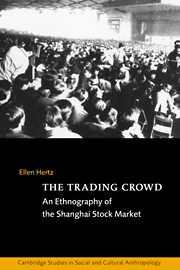Book contents
- Frontmatter
- Contents
- List of illustrations
- Preface
- Acknowledgments
- List of abbreviations
- Conversion rate
- Introduction: Ways and means
- Part I
- Part II
- 5 The big players (dahu)
- 6 The dispersed players (sanhu)
- 7 Guojia: The rise and fall of a super-player
- 8 Conclusion: The trading crowd
- 9 Afterwords
- Glossary of Chinese terms
- Bibliography
- Index
- More titles in the Cambridge Studies in Social and Cultural Anthropology series
9 - Afterwords
Published online by Cambridge University Press: 05 June 2012
- Frontmatter
- Contents
- List of illustrations
- Preface
- Acknowledgments
- List of abbreviations
- Conversion rate
- Introduction: Ways and means
- Part I
- Part II
- 5 The big players (dahu)
- 6 The dispersed players (sanhu)
- 7 Guojia: The rise and fall of a super-player
- 8 Conclusion: The trading crowd
- 9 Afterwords
- Glossary of Chinese terms
- Bibliography
- Index
- More titles in the Cambridge Studies in Social and Cultural Anthropology series
Summary
Financial markets may not be natural but they do abhor a vacuum. The void left by the “defeat” of “the State” over the course of 1992 was quickly filled – by the state. The new actors on the stock market scene since 1992 are “institutions” (jigou), a term that is modeled on Western stock markets, hinting at the presence of pensions funds, private insurance companies and the like. To avoid these misleading connotations, I prefer to translate this term by the English “organizations,” for if we look at how these organizations are constituted, we find that behind each and every one lies an arm of the central or local bureaucracies which makes up the tributary state apparatus. Given the dimensions of market capitalization in Shanghai – 480 billion yuan as of June 1996 – the consensus among the investing public is that “organizations” are the only players with sufficient capital to influence the market.
“Organizations” are state-backed securities firms and state-backed institutional investors. In 1992, these off-shoots of the bureaucratic system were just beginning to get a taste for the kind of money to be made on financial markets. Since then, these organizations have gained increased discretion over the use of funds, especially those funds already raised on the stock market, and have thrown themselves into the game of speculation with a vengeance, drawing on all of the possibilities for official corruption (guandao) which this market leaves open.
Information
- Type
- Chapter
- Information
- The Trading CrowdAn Ethnography of the Shanghai Stock Market, pp. 191 - 199Publisher: Cambridge University PressPrint publication year: 1998
